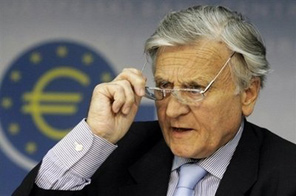Steady as she goes for ECB as green shoots blossom
FRANKFURT: The European Central Bank will keep rates at historically low levels Thursday, analysts said, as it waits to see if the tentative signs of improvement in the economy bloom into a full-blown recovery.
The 22 central bankers gathering on the 36th floor of the vast Eurotower here will at last have some welcome positive economic data to consider, as they set borrowing costs for over 300 million people in the 16-nation eurozone.
France and Germany, the zone's two top economies, unexpectedly escaped the clutches of deep recession in the three months to June. Meanwhile, inflation, the bank's main concern, has remained subdued, pointing to steady rates ahead.
"In our view, the ECB is on hold for now, with further easing only likely in a situation of new emergencies," said Juergen Michels, an analyst at Citigroup.
Several senior members of the bank's decision-making council, including Chief Economist Juergen Stark, have said recently that rates are "appropriate" code for saying they are unlikely to change in the near term.
As the crisis unfolded, the ECB rapidly slashed its main lending rate from 4.25 percent in October to its current level of one percent.
It also supplied huge amounts of cash to commercial banks in a bid to get credit flowing to businesses and households with mixed results.
On Thursday, the bank published M3 money supply figures, a key indicator of credit and demand, which continued a five-month downward trend, showing a lack of inflationary pressure.
These data too point to the bank keeping its interest rates on hold, said analysts at Barclays Capital.
"The ECB is likely to interpret (the) data as signalling that the profound nature of the financial crisis means that, from a monetary policy perspective, we are still in for a 'long haul'."
Other economists said the figures, which also showed credit growth in the eurozone slowing sharply, would mean the ECB would keep its finger on the interest rate trigger in case the credit situation suddenly worsened.
The data "illustrate how fragile the ongoing recovery is," said Carsten Brzeski from Dutch bank ING.
Analysts and financial market players will also be waiting eagerly for the bank staff's updated forecasts for the eurozone economy produced every three months which offer clues to the ECB's thinking on future rate moves.
In their last set of projections, the staff said it expected the eurozone economy to shrink by 4.6 percent this year and by 0.3 percent in 2010.
However, upbeat business surveys are likely to trigger an admission by the bank that the economy is chugging along better than expected, analysts said.
"The better than expected data lately will almost certainly prompt an upward revision to the staff's economic forecasts," said Jennifer McKeown from Capital Economics.
She added the bank's "previously downbeat" assessment for recession to drag into next year would "probably be replaced with a moderate expansion."
Nevertheless, the ever-cautious president of the ECB, Frenchman Jean-Claude Trichet, said recently that talk of a recovery made him "uneasy" and stressed that there was a "long and bumpy road ahead."
"This all supports our view that ECB interest rates will be on hold at one percent for the foreseeable future, in contrast to markets' current expectation that they will start to rise early next year," McKeown said.






